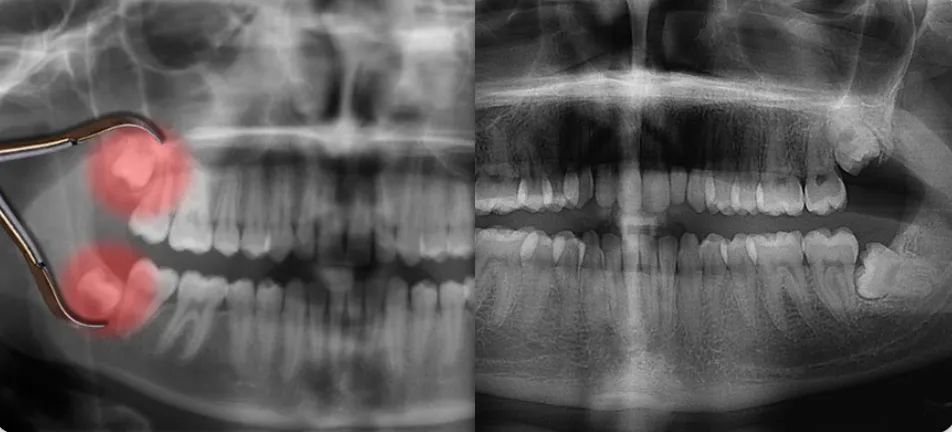Dental Emergency? Call us!
Wisdom Teeth Removal
We are here to serve you when you need us most.

Wisdom teeth removal is a procedure where your wisdom teeth are extracted by your dentist through a surgical procedure. The reasons may vary with each individual and the wisdom teeth may need to be extracted for preventive or other reasons. Wisdom teeth are the final set of teeth to erupt and often find less space in your mouth to erupt properly. This leads to an improper eruption that causes pain, discomfort, swelling, or overcrowding. Your dentist may inspect your teeth and suggest a wisdom tooth extraction where necessary.
The sooner a wisdom teeth removal happens, the more beneficial it is. Your dentist may do an x-ray or a clinical examination to understand which wisdom tooth needs to be removed or if all your wisdom teeth need to be extracted. Not all wisdom teeth need to be extracted, please reach out to your dentist to know more. At Expressions Dental we offer local anesthesia, IV sedation, or nitrous oxide sedation for wisdom teeth extraction.
Dangers of delaying a wisdom teeth extraction
A wisdom tooth that does not erupt properly may be a breeding ground for bacteria that may eventually lead to tooth decay if left untreated.
Some other dental problems that they may cause are:
1. Pain or discomfort.
2. Lead to cavities.
3. Damage adjacent teeth by grinding against them.
4. Lead to a dental abscess or cyst.
If you have wisdom teeth that are causing discomfort, it is recommended to visit your nearest dentist to get them examined. Your dentist may place you under sedation to numb your teeth before performing the extraction. In some cases, you may be referred to a surgeon.
Once the wisdom teeth are extracted you may experience pain, swelling or bleeding from the gums. After the extraction, your dentist may suggest you bite on a gauze to stop the bleeding. Generally, the recovery happens within a week after the extraction.
Your dentist may suggest a pain killer to reduce the discomfort, placing an ice pack over the area which held the extracted tooth, avoiding rinsing, brushing, or flossing for 24 hours, soft foods for the first day, and other measures to make the recovery process as smooth as possible.
Book Your Appointment
SKIP THE WAITING ROOM!
Don’t Wait and Book Now!
Request an immediate Call Back!


What they say about us
Seriously amazing state of the art clinic. From the moment you enter, extremely clean, receptionist greats you very politely and professionally unlike my previous place that seemed to always be somehow quite lost. Very on time and smooth throughout the first part of X-rays and checking things.

I highly recommend this dental office, the dentists, front desk and dental assistants are very professional and welcoming.

Great clinic, very courteous staff and well maintained, would recommend!

